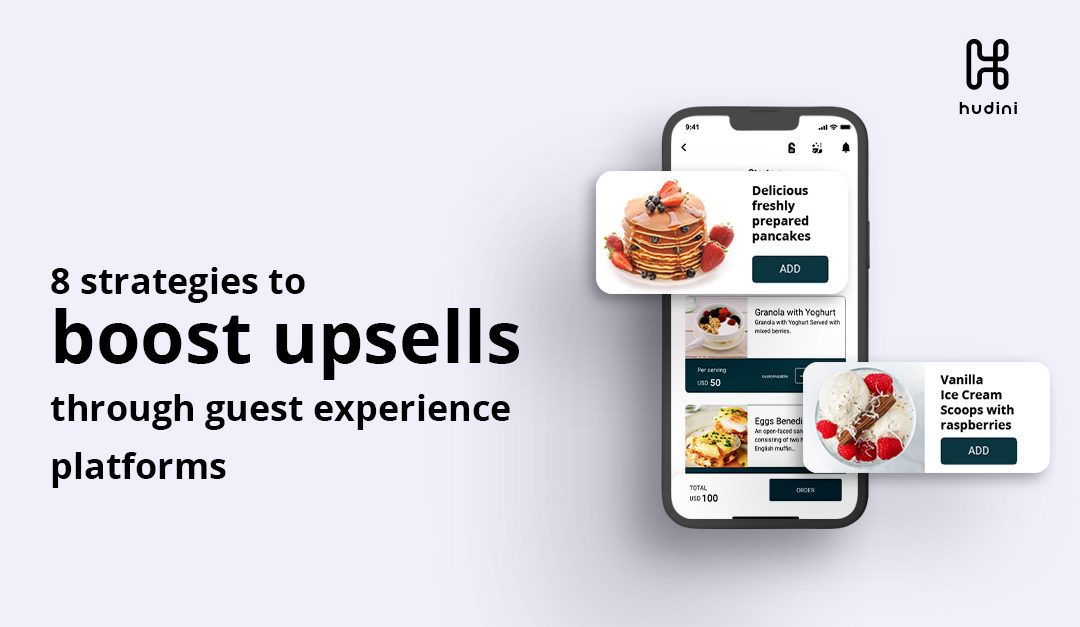Guests might book a room at your hotel, but it’s the add-ons that make them glad they did. It could be a spectacular view or a specially-curated F&B menu – guests are always seeking that ‘little extra’ to elevate their stay.
This gives hotels opportunities to upsell and cross-sell while improving guest experience. Typically, hoteliers consider booking and check-in as the best times to suggest an upgrade. However, with data-powered guest engagement platforms like Hudini, hoteliers can tap into upsell opportunities throughout the guest journey. Hudini, for example, connects every touchpoint of the guest journey on a single interface that guests can access on their mobile devices. Apart from enabling online check-ins, the platform helps guests control their room’s temperature and lighting, customize in-room dining orders, schedule room cleaning, seek assistance from the 24×7 digital concierge, and more.
Hotels have been quick to leverage the customization, interactivity and rich data that a digital guest engagement solution provides. Here are a few best practices that can further improve guest satisfaction and ROI.
1. Create awareness and interest
Most guests are unaware of a hotel’s native app till it’s pointed out to them; train staff to help guests explore the platform or place posters in prominent locations to highlight its benefits. Sunlife Resorts, whose YourSunlifeApp was built by Hudini, ran an awareness campaign that saw 65% of guests downloading the app. With the app’s push notifications, you can also announce events and specials. Hosting a buffet of local delicacies at your restaurant? Advertise it to your international guests using catchy text and vibrant visuals.
2. Boost demographics with data
The data generated by hotel apps can enrich guest segmentation, enabling hotels to offer more targeted add-ons. Over time, this data can be analyzed to see which upgrades are the most popular so that they can be offered at a premium. Data can also specify the best time to suggest an upgrade and create more detailed individual guest profiles for precise targeting.
3. Create packages and bundles
Data reveals consumption patterns and provides insights into guest behavior. For instance, data might reveal that the most popular in-room dining option for families traveling with children is burgers and milkshakes. Through the hotel app’s push notifications, this meal can be highlighted as a discounted bundle, and families have a higher chance of ordering it to their rooms instead of dining at a local cafe. Target different guest segments with unique bundles – floral bouquets and a bottle of wine for a couple or connected rooms and buffet vouchers for a large family are good examples.
4. Customize offerings for each guest
Guest engagement apps allow for a high degree of customization. Digital room service menus can suggest add-ons such as chocolate milkshakes with hamburgers, or oat milk lattes with vegan burgers. Guests could opt for extra room cleaning or faster laundry service for an additional fee. If they would like to try toiletries from a luxury label instead of the standard ones, these could be provided at a premium. While customization presents a business opportunity for hotels, it also gives guests a chance to personalize their stay.
5. Add a 24×7 digital concierge
The hotel app’s multilingual chatbot can provide real-time assistance and updates, serving as a personal concierge for each guest. AI-powered chatbots improve with every interaction, understanding each guest’s preferences to suggest suitable upgrades. This comes in handy when guests use the chatbot to order dinner or select a wellness package.
According to Forrester Research, chatbots could increase conversions by 40% and generate a 10% spike in average order value. For guests, the chatbot is an assistant that makes their stay seamless. For hotels, it’s both an indispensable sales aid and a customer service tool.
6. Partner with local vendors
On hotel apps powered by Hudini, guests can also plan their itineraries. This feature gives hotels the chance to create exclusive packages and differentiate their hotel brand. Travel trends suggest that guests are increasingly veering towards local, authentic experiences; by collaborating with local businesses, hotels can create packages that showcase their cities’ hidden gems.
7. Integrate add-ons with loyalty programs
Purchases made on hotel apps powered by Hudini, whether it’s room service or a spa session, can be synced with the hotel’s loyalty program. This increases the perceived value of each purchase, since guests know that the points earned now can be redeemed during their next stay.
8. Collect and display testimonials
When we consider dining at a restaurant or booking a guided tour, our first instinct is to check the reviews. App notifications can prompt guests to leave feedback about a meal or service. Positive reviews can then be displayed on the app alongside the in-room dining menu, spa packages and sightseeing tours, enabling guests to see what others enjoyed and perhaps even order something similar.
Here’s the most important factor to consider while offering add-ons and upgrades – will this enrich the guest’s stay? A guest will only click on an add-on – whether it’s a discounted breakfast platter or superfast laundry service – if it makes her stay more comfortable, convenient and memorable. With technology, hotels can now not only pick the right offering, but also present it to the guest at the right place and at the right time.
